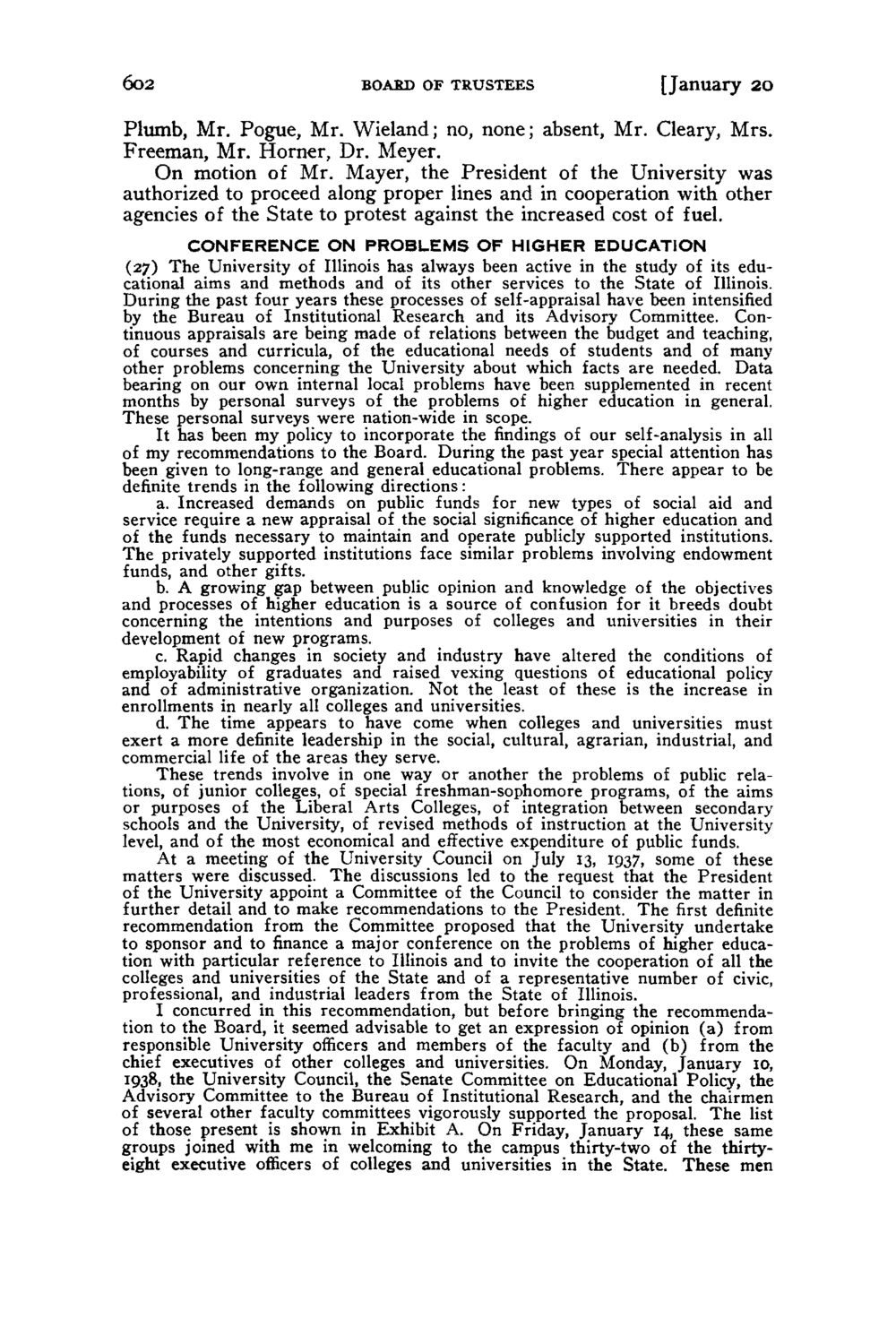| |
| |
Caption: Board of Trustees Minutes - 1938
This is a reduced-resolution page image for fast online browsing.

EXTRACTED TEXT FROM PAGE:
602 BOARD OF TRUSTEES [January 20 Plumb, Mr. Pogue, Mr. Wieland; no, none; absent, Mr. Cleary, Mrs. Freeman, Mr. Horner, Dr. Meyer. On motion of Mr. Mayer, the President of the University was authorized to proceed along proper lines and in cooperation with other agencies of the State to protest against the increased cost of fuel. CONFERENCE ON PROBLEMS OF HIGHER EDUCATION (27) The University of Illinois has always been active in the study of its educational aims and methods and of its other services to the State of Illinois. During the past four years these processes of self-appraisal have been intensified by the Bureau of Institutional Research and its Advisory Committee. Continuous appraisals are being made of relations between the budget and teaching, of courses and curricula, of the educational needs of students and of many other problems concerning the University about which facts are needed. Data bearing on our own internal local problems have been supplemented in recent months by personal surveys of the problems of higher education in general. These personal surveys were nation-wide in scope. It has been my policy to incorporate the findings of our self-analysis in all of my recommendations to the Board. During the past year special attention has been given to long-range and general educational problems. There appear to be definite trends in the following directions: a. Increased demands on public funds for new types of social aid and service require a new appraisal of the social significance of higher education and of the funds necessary to maintain and operate publicly supported institutions. The privately supported institutions face similar problems involving endowment funds, and other gifts. b. A growing gap between public opinion and knowledge of the objectives and processes of higher education is a source of confusion for it breeds doubt concerning the intentions and purposes of colleges and universities in their development of new programs. c. Rapid changes in society and industry have altered the conditions of employability of graduates and raised vexing questions of educational policy and of administrative organization. Not the least of these is the increase in enrollments in nearly all colleges and universities. d. The time appears to have come when colleges and universities must exert a more definite leadership in the social, cultural, agrarian, industrial, and commercial life of the areas they serve. These trends involve in one way or another the problems of public relations, of junior colleges, of special freshman-sophomore programs, of the aims or purposes of the Liberal Arts Colleges, of integration between secondary schools and the University, of revised methods of instruction at the University level, and of the most economical and effective expenditure of public funds. At a meeting of the University Council on July 13, 1937, some of these matters were discussed. The discussions led to the request that the President of the University appoint a Committee of the Council to consider the matter in further detail and to make recommendations to the President. The first definite recommendation from the Committee proposed that the University undertake to sponsor and to finance a major conference on the problems of higher education with particular reference to Illinois and to invite the cooperation of all the colleges and universities of the State and of a representative number of civic, professional, and industrial leaders from the State of Illinois. I concurred in this recommendation, but before bringing the recommendation to the Board, it seemed advisable to get an expression of opinion (a) from responsible University officers and members of the faculty and (b) from the chief executives of other colleges and universities. On Monday, January 10, 1938, the University Council, the Senate Committee on Educational Policy, the Advisory Committee to the Bureau of Institutional Research, and the chairmen of several other faculty committees vigorously supported the proposal. The list of those present is shown in Exhibit A. On Friday, January 14, these same groups joined with me in welcoming to the campus thirty-two of the thirtyeight executive officers of colleges and universities in the State. These men
| |